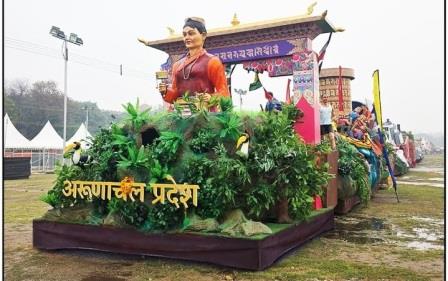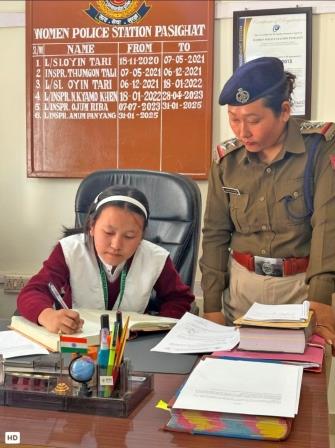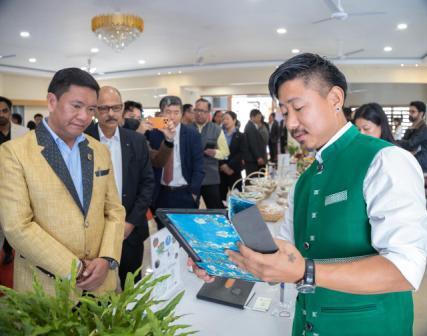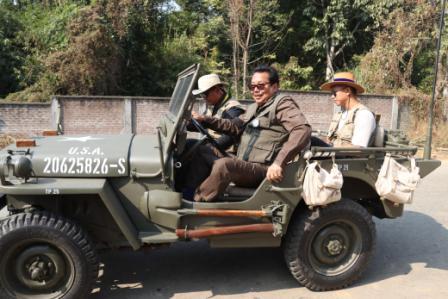-
 Arunachal tableau on R-Day spotlights state’s emergence as Adventure Capital…
Arunachal tableau on R-Day spotlights state’s emergence as Adventure Capital…
-
Etalin marks National Voters’ Day, encourages youth participation in democracy
-
Sona reviews PMGSY, VVP projects in Itanagar Circle
-
Lok Bhavan celebrates UP Diwas
-
 KGBV student leads WPS Pasighat on National Girl Child Day
KGBV student leads WPS Pasighat on National Girl Child Day
-
Meritorious students felicitated on National Girl Child Day
-
Awareness on POCSO held as part of National Girl Child…
-
Anini certifies 79 Nature Guides on National Tourism Day
-
 Startup success stories reflect potential of state’s youth: CM
Startup success stories reflect potential of state’s youth: CM
-
 Mein participates in vintage Willys Jeep Rally, inaugurates World War…
Mein participates in vintage Willys Jeep Rally, inaugurates World War…
The Union Jal Shakti Ministry on Monday conducted a meeting on Jal Jeevan Mission where State Ministers in-charge of Drinking Water from seventeen states including Arunachal Pradesh took part. The meeting was a crucial one since it was devoted for devising strategic plans for implementation of the ambitious target of ensuring water tap connection to every rural household in the country by 2024. If this is really achieved, it will no doubt be counted as a landmark achievement among all rural development initiatives since independence.
It can be recalled that a new Ministry called ‘Jal Shakti’ has been formed after merging various water-related ministries and its principal task will be to provide clean drinking water to the citizens with emphasis on rural India, besides encompassing other equally important issues. Drinking water fulfilling the desired quotients of safety and hygiene is still unreachable to half of the households and walking miles and miles by womenfolk to procure even a small quantity is very common in countless parts of the country particularly during cruel summer months. The situation is only going to turn tight in the coming years which has been almost unanimously predicted in all major reports. A few points from NITI Aayog Composite Report released in June last year will be enough to understand the seriousness of the situation. Currently the country is suffering from the worst water crisis in its history and 600 million Indians has come inside the ring of an extreme water stress with about two lakh annual deaths just due to inadequate access to safe water. It’s not limited to quantitative availability alone, since 70% of the available water is contaminated, placing the country at 120th amongst 122 countries in Water Quality Index. If Chennai’s water woes this year is any indication, it can be said that the crisis is only going to get worse and by 2030, country’s overall water demand will be twice the available supply, which actually means severe water scarcity for hundreds of millions of people in addition to the current figures and an eventual 6% GDP loss. And come 2020, ‘Day Zero’ which means the day when a place is likely to have no drinking water of its own, awaits 21 cities, with presumably many more to join the list.
Arunachal’s target will be steep since only 12.88% of its rural households are now connected with piped water supply system. From the overall context of the country, it can be said that fault lines are deep and states will have to play larger roles, particularly during actual implementation with proactive involvement of all grassroots governance institutions. But however difficult it may seem, the mission must be made possible.

Kenter Joya Riba
(Managing Editor)She is a graduate in Science with post graduation in Sociology from University of Pune. She has been in the media industry for nearly a decade. Before turning to print business, she has been associated with radio and television.
Email: kenterjoyaz@easternsentinel.in / editoreasternsentinel@gmail.com
Phone: 0360-2212313

